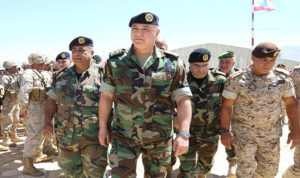
Increasing Lebanon’s military forces on their southern border is viewed as a way for Beirut to contain Hezbollah’s expansion and control throughout Lebanon’s heartland.
• PM Saad Hariri: Israel still remains Lebanon’s primary threat.
By Reuters & Israel Hayom Staff
Lebanon plans to increase its military presence along its southern border with Israel, Prime Minister Saad Hariri said on Thursday at a meeting in Rome, where he is seeking financial support for the armed forces.
Bolstering Lebanon’s army and internal security forces is seen as a way for the international community to keep Hezbollah, which has helped sway the Syrian civil war in President Bashar Assad’s favor, from broadening its clout in the Lebanese heartland.

Lebanese PM Saad Hariri.- U.S. State Dept/Public Domain
Some 40 countries participated in the meeting, along with and United Nations Secretary General Antonio Guterres. While some financial aid was announced on Thursday, Hariri said that the goal of the meeting was not to gather pledges.
The Lebanese Armed Forces took no part in the 2006 war between Israel and the Lebanese Shiite terrorist group Hezbollah, which is backed by Iran. Since then, it has received more than $1.5 billion in U.S. military assistance and, in the last seven years, training and support from U.S. special forces.
“We will be sending more LAF troops to the south, and we stress our intention to deploy another regiment,” he said, adding that Israel “remains the primary threat to Lebanon.”
“While we are thinking of ways to move from a state of cessation of hostilities to a state of permanent cease-fire, Israel continues to make plans to build walls on reservation areas along the blue line,” Hariri said.
In a joint statement, the conference participants said Lebanon should “accelerate effective and durable deployments to the South.”
The U.N. Security Council has allowed for 15,000 Lebanese troops to be deployed along the border since the end of the 2006 conflict.
On Thursday, Hariri said he presented the five-year plans for Lebanon’s military and security services to the participants, and each country would decide in the coming months how it could help.
The European Union pledged €50 million ($61.6 million) to Lebanon’s security forces, and Hariri said France had created a €400 million ($492 million) credit facility to purchase equipment for Lebanon’s military and security forces. The U.K. has pledged an additional $13 million, it said on Twitter.
“I’m extremely satisfied with the outcome,” Hariri said after the conference.
Hariri dismissed concerns that weapons intended for the Lebanese army would end up in the hands of Hezbollah, saying, “We have never lost a weapon to anyone … and it will never happen in the future.”
Hariri further reiterated his commitment to the policy of “dissociation,” which is meant to keep the deeply fractured state out of regional conflicts such as the Syrian civil war.
Guterres told reporters: “This is the moment in which the international community needs to express its full support” for Lebanon.
Italian caretaker Prime Minister Paolo Gentiloni said Lebanon’s stability was vital to the region.
“Lebanon must be sheltered from the forces of destabilization,” he said. “Assuring Lebanon’s stability assures the broader security of the Mediterranean and, as a consequence, of Europe.”
The Rome meeting is the first of three aimed at helping Lebanon stimulate its economy and weather the neighboring civil war and attendant refugee crisis.
View original Israel Hayom publication at:
http://www.israelhayom.com/2018/03/16/lebanon-plans-to-boost-army-presence-on-israel-border/






 Israeli New Shekel Exchange Rate
Israeli New Shekel Exchange Rate